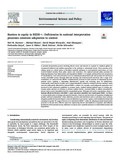| dc.contributor.author | Dawson, N. | |
| dc.date.accessioned | 2021-02-24T11:47:38Z | |
| dc.date.available | 2021-02-24T11:47:38Z | |
| dc.date.issued | 2018 | |
| dc.identifier.citation | Neil M. Dawson, Michael Mason, David Mujasi Mwayafu, Hari Dhungana, Poshendra Satyal, Janet A. Fisher, Mark Zeitoun, Heike Schroeder,
Barriers to equity in REDD+: Deficiencies in national interpretation processes constrain adaptation to context,
Environmental Science & Policy,
Volume 88,
2018,
Pages 1-9,
ISSN 1462-9011,
https://doi.org/10.1016/j.envsci.2018.06.009 | |
| dc.identifier.uri | https://opendocs.ids.ac.uk/opendocs/handle/20.500.12413/16116 | |
| dc.description.abstract | A national interpretation process involving diverse actors and interests is required to transform global environmental initiatives into policies appropriate to the national or subnational context. These processes of localising norms are critical spaces to formulate equitable pathways to environmental conservation, yet have received limited attention from policy makers and researchers. We explored national policy processes for Reducing Emissions from Deforestation and Degradation (REDD+) in Uganda and Nepal from the perspectives of ‘intermediaries’, state and civil society actors at subnational and national scale who promote the interests of various stakeholder groups. Through think-tank meetings and semi-structured interviews with a range of intermediaries, we uncovered that REDD+ implementation processes in both countries are dominated by international actors, applying a demanding administrative agenda and restricting space for deliberation. Consequently, social aspects of policy were compartmentalised, reduced to technical exercises and local equity concerns inadequately addressed in national REDD+ policies. For example, social safeguards approaches were perceived to lack substantive guidelines to promote equity. Limited national political space to criticise government policy and lack of attention to relevant evidence further restricted ability to address entrenched injustices such as status inequalities faced by marginalised groups. Although civil society organisations choose to maintain official involvement with REDD+, many expressed a possibility they would oppose REDD+ in future, or serious doubts about its design and expected outcomes. Concerns centred on lack of recognition of indigenous peoples’ and local communities’ values, identities, practices and institutions such as customary tenure systems, alongside possible detrimental impacts to decentralised forest governance regimes, well established in Nepal and emerging in Uganda. We suggest features to be enshrined in REDD+ policy for adapting national interpretation processes to become more effective spaces for empowering diverse intermediaries to negotiate and influence localisation of international norms, ultimately to promote more equitable pathways to reduced deforestation and degradation. | |
| dc.publisher | Elsevier Ltd | |
| dc.rights.uri | http://creativecommons.org/licenses/by/4.0 | |
| dc.title | Barriers to Equity in REDD+: Deficiencies in National Interpretation Processes Constrain Adaptation to Context | |
| dc.type | Article | |
| dc.rights.holder | © 2018 The Authors. Published by Elsevier Ltd | |
| dc.identifier.externaluri | http://dx.doi.org/10.1016/j.envsci.2018.06.009 | |
| dc.identifier.ag | ES/N005740/1 | |
| dc.identifier.doi | 10.1016/j.envsci.2018.06.009 | |


